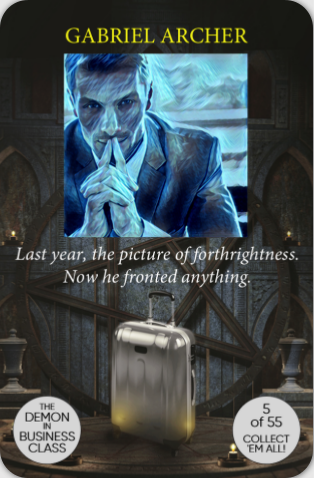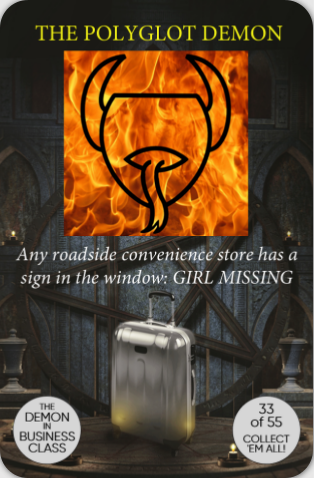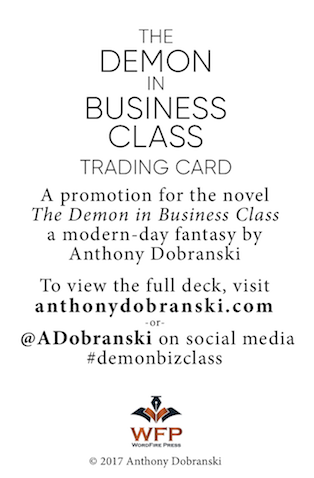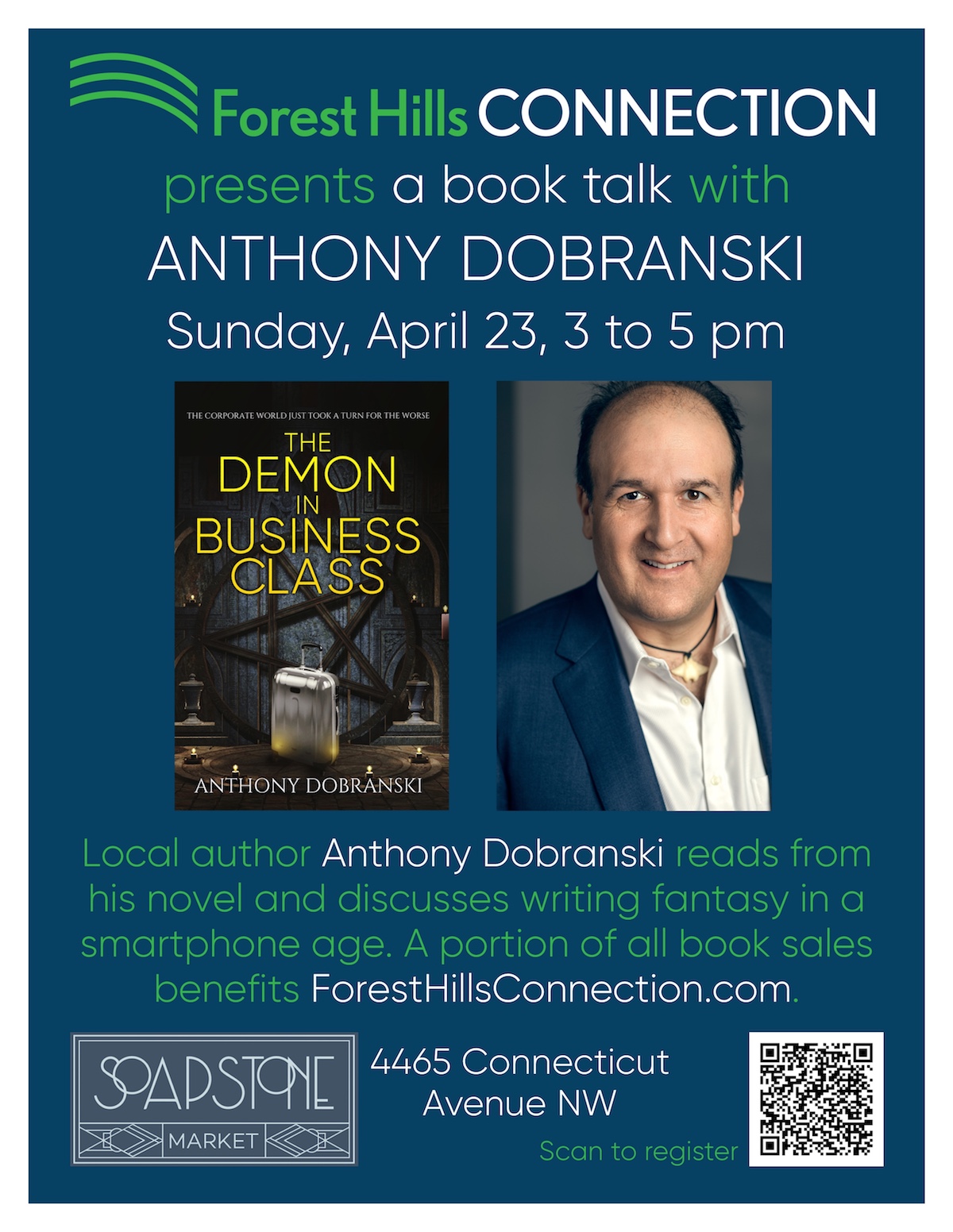I am sorry to have been so silent. In between summer travels with family, all my projects have been in construction phases, and I don’t like vague-posting.
But, news. I have several author events scheduled for this fall. You can find me at:
The Fredericksburg Independent Book Festival, Fredericksburg, VA, Sat Sep 23
YABBAFest, Warrenton, VA, Sat Oct 14
Quest-Con, Mobile, AL, Fri Oct 20-Sun Oct 22
Philcon, Cherry Hill, NJ, Fri Nov 10-Sun Nov 12
I have also begun recording The Demon in Business Class audiobook. People who sign up for my mailing list at Fredericksburg or after will get a free copy of the early session recording of Demon chapter 1.
Want in on the goodies? Sign up too!
The third project is of course my new novel, which I finally have come to admit is not going to be fleshed out from the previous manuscript, but completely rewritten. I have however set myself the semi-impossible goal of debuting it next year at Atlanta’s massive DragonCon, which means that next week I get to writing in a headlong Phildickian rush. Well, maybe not, but I have a lot to do.
I’ll be posting about the book in a couple of days, since I can actually discuss it now and show some concepts.
A fourth project … awaits much more solid scheduling. Suffice it to say I am working with great artists.
Author: Anthony Dobranski
-
A quick hello during a busy season
-
Hello Florida Supercon – goodbye wonderful Raleigh!
Hope to see you this coming weekend, July 27-30, at Florida Supercon in Fort Lauderdale, FL. I’ll be at the Bard’s Tower booth all four days of the con with Kevin J. Anderson, Josh Vogt, Kevin Ikenberry, Keith DeCandido, and J Scott Savage. I have one scheduled panel, on using real world experiences in fiction, at 3:30pm on Thursday.
I’m pleased that Florida Supercon is under the same management as last week’s Raleigh Supercon. Raleigh was a tremendous event, well-run and with a welcoming energy. I met many enthusiastic people, and even got to join a panel on Religion and Magic.
I’m very lucky to have Bard’s Tower as a promotional outlet to the world of fan conventions. Bard’s Tower helps me connect to my audience while working in a collaborative way with fantastic and experienced writers. Speaking as a business, tens of thousands of people with hundreds of options and real-world budgets are a brutal lab for direct marketing. As an artist, it’s an incredible chance to find that certain reader my work really speaks to, live and in-person — an unrivaled source of joy. -
Hello Connecticon 2017 – and thanks!
Tonight I fly north to Hartford, CT, to join the Bard’s Tower booth opening Friday at Connecticon. It’s the first of three cons I’m doing in July at Bard’s Tower, with other fantastic writers.
Cons are intense, by design, and they’re also long days standing on concrete. Three cons in four weekends is a heavy schedule, personally tiring and hard on my family. Still, #livingthedream . These are my last big cons this calendar year. I want to connect with every interested reader during my hours in these big convention halls.
How immediate these connections can be! People know their tastes, even if naming them with difficulty, but they feel. Once in a while I get a visual clue that a convention-goer might be my audience – cosplaying Sandman‘s Death, or wearing an Unknown Pleasures t-shirt – but more often, the readers find me and click. I’ll see an hour of people glancing away, then a delighted voice reads my title aloud and everything brightens.
Connecticon 2016 was my first con behind the table, learning to connect with readers in person and find their interests, before my launch in Cincinnati. Seeing how little time one gets in the hugeness of a con convinced me to market overtly to a niche sensibility.
I am excited to come back with my book – and new trading cards! -
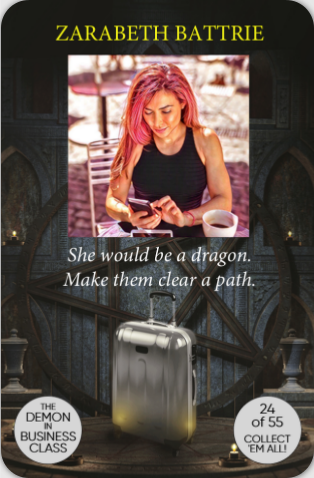
New Demon trading cards!
As a promotion on social media for The Demon in Business Class, I created a virtual trading card deck. For cons, I printed card versions of the nine character pictures. They were done as a last-minute inspiration, made by shoving the cards’ original Instagram proportions into a business card template on Moo.com, the excellent online printer. The cards turned out to be popular at cons and events, and at a better cost-per-item than postcards.
I updated the info on the back and resent the cards to print a larger order – seven this time, of the original nine, because nine is unwieldy at a con; and extra Zarabeths.
This time, Moo said the uneven border made for unsatisfactory results, and offered me the chance to do the cards over with new images. They were right of course, and I took the opportunity.
At my upcoming cons in Hartford, Raleigh, and Ft Lauderdale, I’ll be sharing the good word about Demon with new promotional trading cards!
-
The Inner Loop reading series
I had a great evening under twilit stars – and frequent, seemingly aimless helicopters – with The Inner Loop, a monthly DC reading series for poetry, fiction and non-fiction writers, at Colony Club. The headliner was Jennifer Atkinson, a poet drawn to human disaster, with readings by Joel Goldberg, Matthew Moniz, Alyssa Oursler, Alex Aronovich, Peg Alford Pursell, Alan C. Page, Leila Rafei and Sam Mahone.
Standing room only!
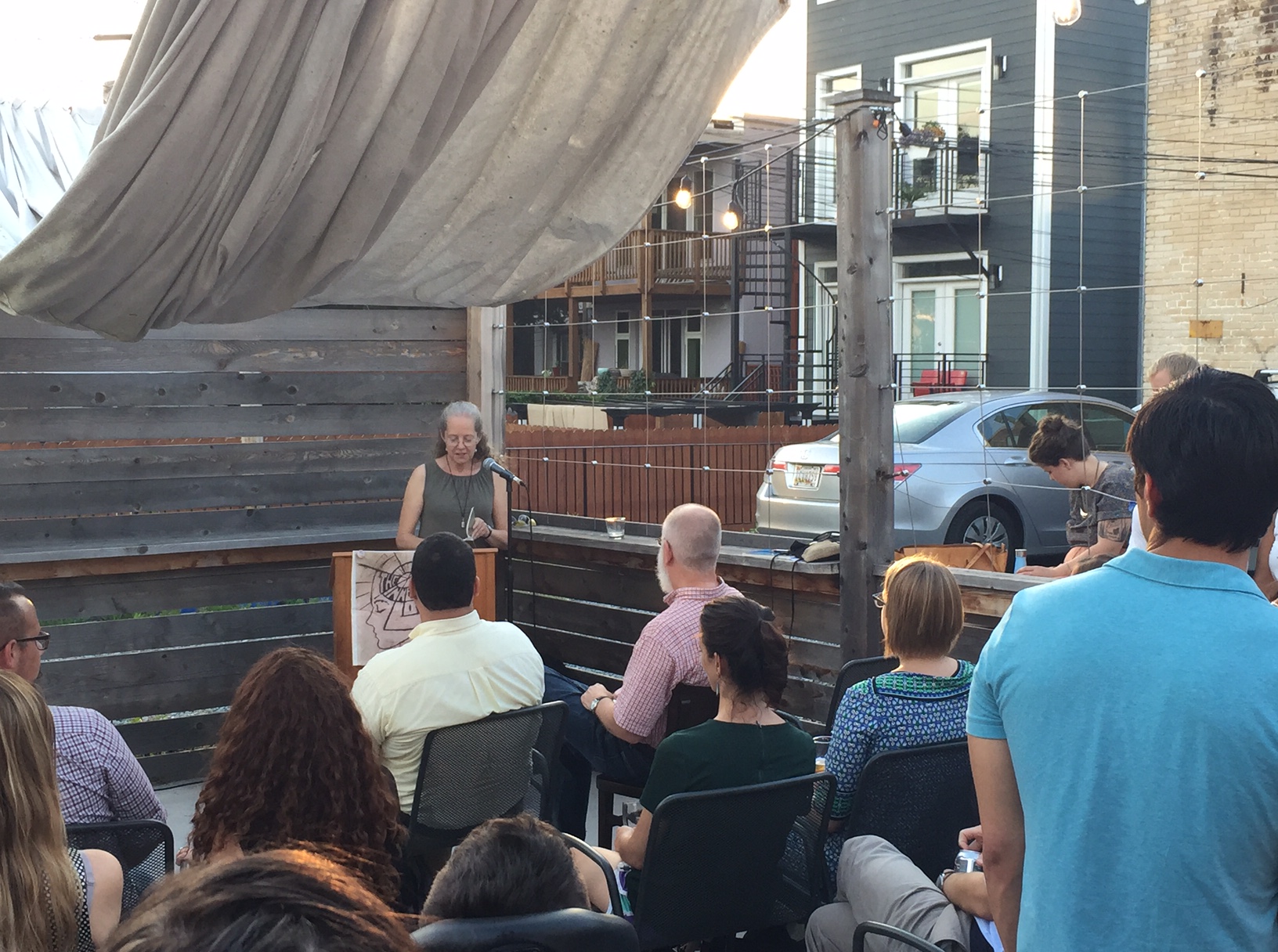
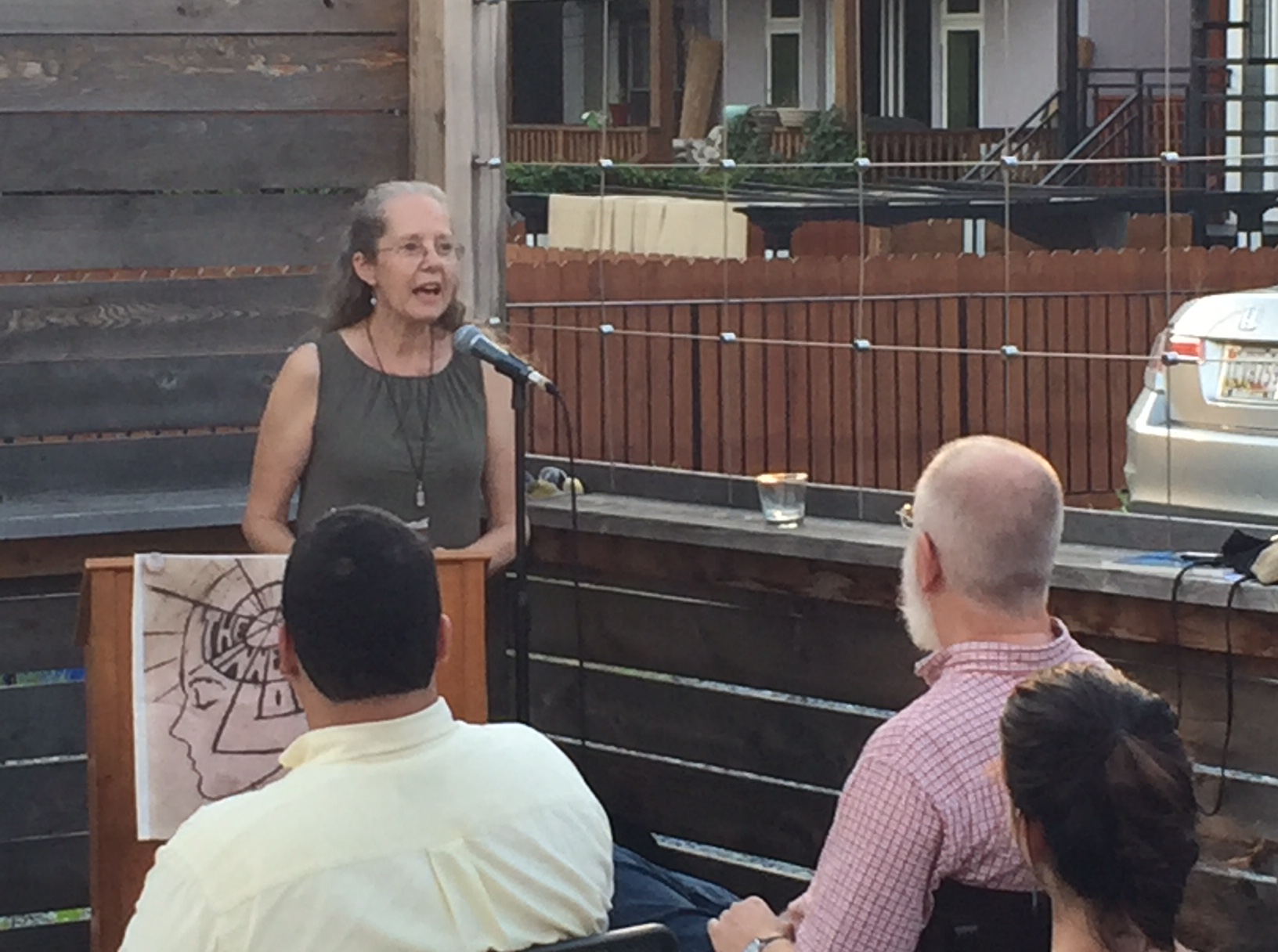
I’m firmly in the camp that writing is an art for the ear. Studying other languages’ poetry let me hear the latent music in my own writing. I always want my work to sound good aloud and I love to hear other authors reading. It’s a happy time for this viewpoint, with the growing market, and quality, of podcasts and audiobooks. I’ll be fascinated to see how English prose style changes for a world where most of it is heard not read. (Prediction? Dialogue tags will lose “said.”)
The evening had a warm, friendly feel. I talked shop with other writers, books with readers. A writing event is quieter than a band, with no dancing or chatter and surprisingly little phone use other than recording videos. The vibe remains casual and attentive. Even for the writers – 5 minutes, and you’re back in the audience.
There will be a bigger market for these. Already the Moth series has spread to live events in several cities. Reading for performance will be the new penmanship. -
Moorcock’s heir, Gregory D Little (review)
It’s an article of nerd faith that, before Peter Jackson filmed it with pretty people, the weird kids read The Lord of the Rings. I was a weird kid, to be sure, and I read it. Half. I bogged down at the Ents, skipped ahead to Shelob, and then straight to Mount Doom. None of the appendices.
Truth? Weird kids read Michael Moorcock. Cruel decadent gods, civilizations in decline, addictions, hallucinations, family betrayal, doomed passion – and, at best, a personal morality jerry-rigged from friendship, adventure, and the faint hope inside a calloused heart.
In my world of young adult novels with obviously good heroes fighting obviously evil totalitarians – from A Wrinkle in Time through Harry Potter to Hunger Games – someone needed to take up Moorcock’s heavy-metal mantle of trippy morally-conflicted fantasy, where no choices are good and the only victory comes with pain and loss. Someone still needs to write for the weird kids.
Thank the stars, then, for Gregory D. Little, whose new novel Ungrateful Souls has just been published.
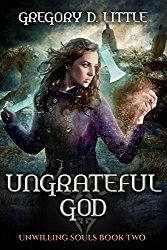
In Little’s strange, mind-bending fantasy novels, humanity long ago won a ruinous victory in a war against its vicious gods, imprisoning them in the Pit, a great bubble built deep in the hot lava mantle of their planet. The Pit requires constant maintenance, by smiths who still use the gods’ horrid soul-technology of wrightings, iron and crystal devices powered by the trapped souls of the dead.
Yet the Pit is a privileged place, with clean clothing, cool gear, and a safe space for teen angst. On the surface, humans live a rough iron-age existence in stone and wood huts, their only cities the colonized carcasses of the gargantuan monsters the gods once bred to oppress them. Some humans are still Blazing, their glowing eyes marking them as descendants of the godly, earning them fear and resentment from the unmarked Dims. All live under the heel of the Polistraat, a police force charged with keeping secret worshippers from freeing the gods, but grown self-righteous and brutal after centuries of their paranoid work.
Ungrateful God continues the harrowing journey of Selestia “Ses” Lucani, the conflicted heroine of Little’s Unwilling Souls series. She began the first book as a conventional young-adult heroine, with awkwardness, a secret destiny and big girl-crushes. She ended in a vastly darker place, betrayed by both her undercover-Polistraat lover and her god-possessed father, but now empowered to free the souls trapped in wrightings, turning these incredible machines into sand and dust. Her unusual eyes, one Dim one Blazing, give her the power to see “demons,” humans like her father in secret thrall to a god.
In Ungrateful God we find her in humble circumstances, making her way with a small force of Artisan Guild rebels to the remote unpoliced city of Ocypode, built on the shell of a crab so enormous that its barnacles house hotels and taverns – and with its own gravity, so that one lives on it in all planes, like an Escher drawing or the game Monument Valley. In Ocypode, society is breaking down in an uncomfortably godly way; some disappear while many more suffer nightly blackouts, unable to explain why they wake in different places than they went to sleep. When Ses’s fellow Guilders disappear, she must navigate the treacherous city while avoiding both the Blazings and the demons. Her only uneasy allies are Lach, of the insular race of Pilots whose ships bring new souls to power the Pit, and Hadrian, a demon enthralled by a rival god to the one behind Ocypode’s problems.
A secondary plot involves Murien, Ses’s Polistraat-spy lover, now undercover as a Pit apprentice even as the Polistraat itself has put the Pit’s smiths under martial law. Still faithful to the goal of keeping the gods imprisoned, Murien can no longer gloss over the Polistraat’s brutality. His betrayal of Ses weighs on him, and his attraction to the lovely Brea opens him to questioning what exactly the Gnaeus, the nasty Polistraat commander, has in mind.
Little writes engagingly, full of sensory details and wry asides. Even as the settings and visuals grow grow ever more hallucinatory – and much larger in scale (I did say, gargantuan monsters) – he always keeps things grounded in the other senses of Ses’s rough existence: the clamor of taverns and markets, the feel of rough cloth, the smell of bad tavern food and unwashed bodies – especially, like any teenager, her own unwashed body. Even the magic of the soul-technology requires believable work to craft and use.
Little also keeps a tremendous number of plates spinning. It’s impressive to see how this complicated plot, so dependent on multiple histories, comes together into a clear yet phantasmagorical climax. Ses’s despairing awareness of humanity’s dependence on trapped souls offers a theme for today’s reader as complex as the real questions of climate change, without ever being didactic. Ses’s character develops believably, seemingly ever more sensitive to the world after each hardship. I’m not sure even she could say clearly who she fights for, but the reader knows her heart.
In contrast with the glories of Ocypode, the Pit scenes sometimes let me down. Murien’s anger clouds his judgement too conveniently, as does his devotion to the lovely Brea, who has sparks of intelligence but still seems unworthy of all the adoration she inspires.
Still, it’s always hard for the sheltered to seem interesting compared to the unsheltered, be they in Hogwarts or the Pit – and at the end of Ungrateful God, there is no shelter left, a greater storm to come, and Ses is not the only one who pays a painful, damaging price.
If you’re a weird kid, or you used to be, Ses Lucani is the heroine you’ve waited for. Looking for the heir to Michael Moorcock? Check out Gregory D. Little!
Ungrateful God is available on Amazon, as is the series’s first novel, Unwilling Souls. -
Sexual tension in fiction
My guest post for the Fictorians, a site on writing fiction, discusses sexual tension and its different roles in different stories. It’s part of the Fictorians’ month-long Tension series.
Read it at:
http://www.fictorians.com/2017/02/24/sexual-tension-in-fiction/ -
Sticking to my knitting (opinions)
As Facebook gently reminded me —

my professional media have been stale. It was less a writer’s block than a blind alley. Perhaps others will find my thinking instructive.
Like everybody, I have opinions about the world, and in these contentious times, it’s very tempting to share them. Everyone else is, and I talk prettier than many. Why not join the fray? Ooh, ooh, you’re discussing politics, or climate change, or guns? I can do that too!
I drafted three different posts on things political. One even got into my WordPress dashboard, until I deleted it.
Truth is, I just don’t want to be a public intellectual.
It feels irresponsible to say this. In the face of the great activists of the past, and today’s popular writers who still manage worthy columns (or at least snarky tweets) – and often get slagged by some fans for voicing opinions they don’t like – it seems weak to say, nah, I’m out.
I’m out. While it might feel good to get something off my chest, people aren’t waiting around to hear what I have to say about today’s crisis. Or, if people are, they don’t just want it once. If I start down that road, I have to stick with it, have to make it a bigger part of my life and thought.
Perhaps this would be virtuous, but it wouldn’t be singular. Many good people already discuss the state of the world, plainly and well, after actually investigating it and reporting on it. If I want to change the world in favor of my political beliefs, I’m better off writing checks.
Or, writing novels.
Not that I’m going to be ripping tales from today’s headlines. That’s not my thing. More to the point, the political power of good fiction is often indirect. Fiction can say complicated things to culture, often better than it says simple ones. There are political ideas in my novel The Demon in Business Class, but they’re neither immediate nor partisan.
The “messy ground where the worldly meets the divine,” as my back-cover text promises, is a place in the mind. My characters in their big world might inform your opinions about tomorrow’s crisis, whatever it is, but only by example and analogy.
That’s my contribution. We’ll see if it’s enough, over time. -
Love your pile of words (first drafts)
I love my current first draft.
This is a shocking and unfashionable thing to say. Everyone laments their first draft. It is the shoals of mediocrity on which our dreams founder, or at least so tells every clickbait online writing workshop. Complaining about the horror of that first draft is required. Even really successful and also good writers do it, and always have.
I love mine. I banged it out for NaNoWriMo 2015, in fewer than my allotted thirty days. Yes, I know that’s a long time ago (I sold a book in the meantime!), but that length of time is supposed to make clear how awful the first draft is, as the scales of hope fall from my more jaundiced and persnickety eyes.
Alas, I love it, blazingly. I have reread it more than once, with comments from my writing dojo NoveltyDC, and each time I am in a better mood.
It’s got half-finished ideas that I now can’t remember, areas that need major restructuring, a lot of plodding exposition. Some of my best supporting characters – like the smuggler with a tail – are on far too briefly. Late ideas may turn out to be organizing principles. No doubt I will rewrite almost every sentence in it, reorganize it, wrestle it. I may occasionally kick it. It will take a lot of work. Even then it will be niche, strange, uncommercial and standalone.
It’s going to be great.
What is wrong with me? How did I get to this place? How did I find joy and wonder in my work while others gnash teeth and tear hair? It isn’t my success to date, which is tiny; nor is it my upbeat disposition, which is pure fakery. So what is it?
Here’s a thought – I love it because it’s a draft. It may be made of words, but it’s not a novel yet. It’s been work of course, the work of felling trees and forging nails, but this is the lumber and hardware and cleared ground, not the finished house. It’s a pile of words and ideas, and for that, it’s just fine. Well, maybe I will need a few more words.
The draft is the start, the lumber and blueprints. It will not house or warm you, not without a lot of work to come. It’s just a stage.
Get excited. And get to work.

